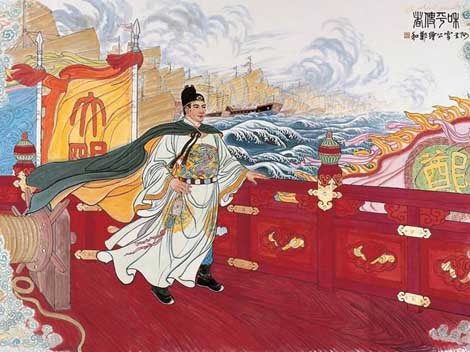The Koay [Guo] clan originates from Hui An, Fu Jian. According to historian Ong Seng Huat who did a research on this unique community, they were Hui Muslims of Arabic descent. Their Muslim ancestry can be traced 20 generations to a Muslim general who controlled Xinjiang and the western part of the Silk Road during the Tang Dynasty. When the political climate became hostile towards Muslims, they suppressed their religious identity, and became more sinicized, easily assimilating into the dominant Han culture. This assimilation is explained in the following words in the Guo family tree record: “First it is the slackening of religious tenets and regulations many religious regulations are difficult to observe; furthermore, as the Ming Dynasty superseded Yuan Dynasty, the minority ethnic groups were put in a difficult position. The Guo clan was the only Hui family, immersed within the big ocean of Hans, they could only lead a simple and humble life. As time went by, step by step they became more like the Hans. Secondly, it was the blood lineage; boys and girls from the Guo family became adults, they had to look for marriage partners, because of the change in situation, they took Han girls for wives, this resulted in the thinning of the Hui blood. Thirdly, came the change in belief (faith) and traditions; Hui girls who married Han husbands, slowly took on Han traditions, so as to fit into the husband’s lifestyle; family life and customs changed; Buddha and other deity statues found place into their homes; in the end, they started to erect tablets for the ancestors, and worshipped them.”
This original Hui clan, even though they did not practice Islamic tenets anymore, still retained many Hui ethnic customs. For example, when they offer food for worship purposes, they will not use pork meat, or any food cooked in pork oil. Many families have a set of ‘clean’ kitchen utensils to be used for specific occasions. The Koay clan came to Singapore and Penang in the late 19th century. Here they found a big number of Chinese immigrants from Fu Jian who shared their language and culture. Even though there were other Muslim communities, these Chinese Muslims found it difficult to integrate, being so different in language, culture, and even some Islamic beliefs originating from different traditions. It was easier to survive among their compatriots who had a different religion, than with their co-religionists with different living habits. “They felt alienated from the larger local Muslim community, and closer to the mainstream Chinese community on whom they had to depend for support.”
Ong reports that the Koay community published in 1975 an edict to be hung in the house of every clansman. “The notice is a reminder of their religious identity as Muslims. It stated that due to great differences in human relations and environment, they had gradually departed from Islamic teachings. To honour their ancestors, however, they would strictly observe the halal food.” (STAR, 23rd March 2002). Interestingly, one parallel is found in Lugang, Taiwan. Dru Gladney describes in these words: “ The Guo (Kuok / Koay) in Taiwan no longer claim they are Hui, they are certainly not practicing Muslims, but that does not mean that Hui identity may no longer be relevant to them. They do not include pork in the food offerings to their ancestors, lest they “ruin their mouths”. The maintenance of the pork tabu in ancestor worship indicates that, at the ritual level, there is still some significance attached to Hui identity among the Taiwanese Muslims.”
In Penang, the Kuok lineage, descendants from the same Muslim ancestor as their counterpart in Taiwan, live in this same dilemma. Some families still abide by the decree, some do not. They celebrate Chinese festivals, and generally have no remarkable difference in their lifestyle from other Chinese communities. But they will observe a 49 days taboo from eating pork after a family member dies.
One more family in Malaysia, the Ding family in Ipoh, are also from a prominent Muslim clan in China, dating as far back as a thousand years, descending from a Muslim Arab ancestor. They have a genealogy tree and an ancestor’s monument in Chuanzhou in China. Nested among other memorial monuments, the Dings’ has a very distinct Islamic look, with a small dome and a crescent, and they give no food offerings. The Ding family members in China are still practicing Muslims, but the Ipoh Dings some in Melaka have totally assimilated with the Chinese around them, and do not say that they are Muslim. The younger generation very probably does not even know about their family’s old Muslim identity.
Home »
The Koay Clan
» The Koay Clan
The Koay Clan
Written By Malaysian Chinese Muslim on Friday 25 February 2011 | 13:36
Labels:
The Koay Clan



